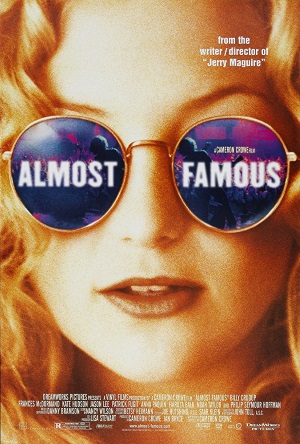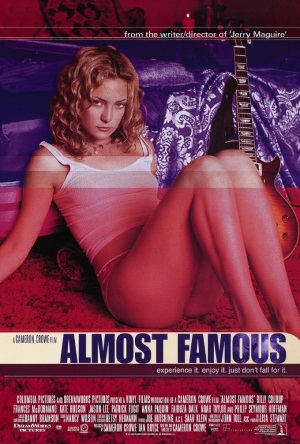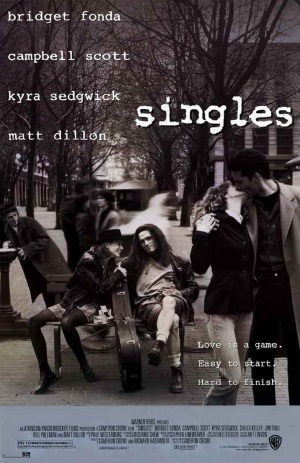Evergreen: “Almost Famous”
Last updated on 30 December 2020.
It’s been a while since I wrote anything about my favourite movies and series. While I do regular updates on what I’ve seen on Facebook (now collected here, too), there’s little discussion on what is good, let alone why that is.
I’ve also come to realise that there are certain movies that I like so much that I’ll suggest them to everybody who could be interested. They might not be the best in the strictest sense (whatever that may mean) but they are movies that I can and do recommend at the slightest excuse. I’ve seen them many times, they’re my evergreens.


This article will discuss one of them: Almost Famous. It was released in 2000 (2001 in the Netherlands) and I think I first watched it in 2004. It’s a semi-autobiographical movie, written and directed by Cameron Crowe. You probably know his Jerry Maguire (“Show me the money!”), the movie that preceded Almost Famous. More about him later.
Our protagonist is William Miller (Patrick Fugit), a fifteen-year-old, precocious teenager who through the influence of his sister (Zooey Deschanel) wants to be a rock journalist. It’s 1973 and according to rock journalist Lester Bangs (the late and great Philip Seymour Hoffman) William’s just in time to catch the death rattle of rock ’n’ roll. He sends William off to write about a Black Sabbath concert, where he gets in by flattering the band Stillwater. He also meets the mysterious and charming Penny Lane (Kate Hudson) and her friends. They’re groupies but prefer the term “Band-Aid” and it’s not as if bright-eyed, naive William is going to argue the point.
Shortly afterwards Rolling Stone magazine, thinking they’re dealing with a much older writer, sends him on the road to do a story on Stillwater. With all the pieces in place, the story sets off proper. Wait, I’ve got a trailer for you to get you up to speed.
This is one of those trailers that tells a lot of the movie’s storyline but to be honest, there’s little to spoil. If I look at the flick critically, I have to admit the plot is rather predictable. This is pretty much a road movie and as such, a lot of the movie’s strength is in the voyage, not so much the destination. We learn more about the characters along the way and how their interactions change them. Of course William has fallen as a block for Penny, and Penny for the lead guitarist Russell Hammond (Billy Crudup). But what do you know: Russell is married and his wife joins the tour at one point. Awkward!
There are also the usual struggles between the lead singer Jeff Bebe (Jason Lee) and Russell. “From the very beginning, we said I’m the front man and you’re the guitarist with mystique. That’s the dynamic we agreed on.”
So what is the movie about? It’s about a rock band in a time that rock ’n’ roll was on its way out. It’s about life on the road, music, and living for the music. As Band-Aid Sapphire (Fairuza Balk) exclaims at one point: “They don’t even know what it is to be a fan. Y’know? To truly love some silly little piece of music, or some band, so much that it hurts.”
At the same time, it’s about a young kid that’s growing up. He tries to find his place in the world, and has to come to terms with the fact that your heroes can be dicks at the same time.
Many scenes are taken from Crowe’s personal experience or refer to rock-related history. He is probably wearing rose-tinted glasses and romanticised those experiences, but it lends the movie some verisimilitude. And if it’s all a little bit too good to be true, well, I would like to believe that it was like that. Or as Nathan Rabin says in The Bataan Death March of Whimsy Case File #1: Elizabethtown:
Hell, I don’t just love many of Crowe’s movies: I want to live in his world. For the universe of Almost Famous, Jerry Maguire and Say Anything is an infinitely humane realm ruled by an endlessly benevolent deity: Crowe himself. It’s a world where no existential quandary is so great that it can’t be solved by the perfect combination of pop song and dream girl, a world of giddy pop epiphanies and gentle humanism unencumbered by protective irony or sneering cynicism.
Thank you, Mr. Rabin, for articulating what is the through-line of Crowe’s work, and the reasons I like his movies.
Crowe’s love for music shines through everything that happens in the movie. The soundtrack is a veritable Who’s Who of American mainstream rock of the late Sixties and early Seventies. Few moments in the movie pass without having some sort of background music going on, but it’s always supportive and never intrusive.

The acting is pretty good across the board, but Patrick Fugit and Kate Hudson’s performances are sadly the weakest. Sure, they’re likeable enough and especially Fugit’s William is so gosh-darn earnest that you have to root for him. Penny Lane is pretty and charming but if I’m honest, Hudson often can’t elevate her above the “vapid airhead” stereotype.
Fortunately, they’re propped up by the always dependable Frances McDormand as William’s mom, Jason Lee as the charismatic singer Jeff Bebe (he who would later gain fame in My Name is Earl), and others like Anna Paquin and Fairuza Balk. Maybe my favourite role is Philip Seymour Hoffman as Lester Bangs. His performance as the cynical but passionate rock journalist inspired me to find out a little bit more about this historical figure. I read one of his books, and it’s highly recommended if you’re into rock music, at all.
Which version?
Apparently there are three versions of the movie. The “default” one comes in at 122 minutes and it’s a perfectly satisfactory version and probably your best starting point. Then there’s a 152-minute “DVD extended cut”, and a “Bootleg Cut”, also known as “Untitled”, which is basically the “director’s cut”. It has a running time of 162 minutes. That’s a lot of Almost Famous and it doesn’t change the story, so I can’t call it “required viewing” — but it adds some nice scenes and extends some existing scenes.
And if you’re really into the movie, you can watch it again but this time with a commentary track by Cameron Crowe and his mom. Yes, it’s an semi-autobiographical movie and the creator talks at length about it, with his mother.
Further viewing
If you like this movie, you can safely dig further into Crowe’s oeuvre. He’s remarkably consistent in his themes and tone. Most of his movies are rather harmless and will make you feel good. His high-school flick Fast Times at Ridgemont High is supposedly a classic and it’s nice enough but it didn’t age too well. Say Anything, a romantic comedy with a young John Cusack is better and has some iconic scenes. Crowe’s love of Americana is the driving force in Elizabethtown, with Kirsten Dunst playing the Manic Pixie Dream Girl role, charming the socks off of Orlando Bloom’s character who’s desperately in search of himself.


However, it’s his Singles that is my favourite after Almost Famous. In it a group of friends tries to find themselves in the vagaries of post-school, adult life. Crowe set it in the environment he knew intimately: the Seattle of the early nineties. As such, the soundtrack was a perfect distillation of the grunge scene and its influences.
If you can’t get enough of the rock music, life on the road and how a band and their support can form a family, I heartily recommend Roadies, a 10-episode series that sees Crowe return to pretty much every theme he first visited in Singles or Almost Famous. The extended format gives him room to breathe and develop the characters a bit more, too.
